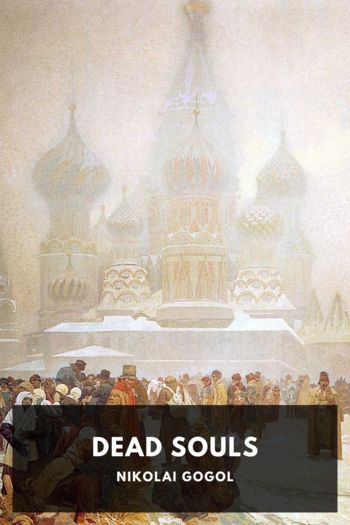Short Fiction - Nikolai Gogol (best selling autobiographies TXT) 📗

- Author: Nikolai Gogol
Book online «Short Fiction - Nikolai Gogol (best selling autobiographies TXT) 📗». Author Nikolai Gogol
Kobita, a good Cossack, though still very young, attacked one of the bravest men in the Polish army, and they fought long together. They grappled, and the Cossack mastering his foe, and throwing him down, stabbed him in the breast with his sharp Turkish knife. But he did not look out for himself, and a bullet struck him on the temple. The man who struck him down was the most distinguished of the nobles, the handsomest scion of an ancient and princely race. Like a stately poplar, he bestrode his dun-coloured steed, and many heroic deeds did he perform. He cut two Cossacks in twain. Fedor Korzh, the brave Cossack, he overthrew together with his horse, shooting the steed and picking off the rider with his spear. Many heads and hands did he hew off; and slew Kobita by sending a bullet through his temple.
“There’s a man I should like to measure strength with!” shouted Kukubenko, the hetman of the Nezamaikovsky kurén. Spurring his horse, he dashed straight at the Pole’s back, shouting loudly, so that all who stood near shuddered at the unearthly yell. The boyard tried to wheel his horse suddenly and face him, but his horse would not obey him; scared by the terrible cry, it bounded aside, and the Lyakh received Kukubenko’s fire. The ball struck him in the shoulder-blade, and he rolled from his saddle. Even then he did not surrender and strove to deal his enemy a blow, but his hand was weak. Kukubenko, taking his heavy sword in both hands, thrust it through his mouth. The sword, breaking out two teeth, cut the tongue in twain, pierced the windpipe, and penetrated deep into the earth, nailing him to the ground. His noble blood, red as viburnum berries beside the river, welled forth in a stream staining his yellow, gold-embroidered caftan. But Kukubenko had already left him, and was forcing his way, with his Nezamaikovsky kurén, towards another group.
“He has left untouched rich plunder,” said Borodaty, hetman of the Oumansky kurén, leaving his men and going to the place where the nobleman killed by Kukubenko lay. “I have killed seven nobles with my own hand, but such spoil I never beheld on anyone.” Prompted by greed, Borodaty bent down to strip off the rich armour, and had already secured the Turkish knife set with precious stones, and taken from the foe’s belt a purse of ducats, and from his breast a silver case containing a maiden’s curl, cherished tenderly as a love-token. But he heeded not how the red-faced cornet, whom he had already once hurled from the saddle and given a good blow as a remembrance, flew upon him from behind. The cornet swung his arm with all his might, and brought his sword down upon Borodaty’s bent neck. Greed led to no good: the head rolled off, and the body fell headless, sprinkling the earth with blood far and wide; whilst the Cossack soul ascended, indignant and surprised at having so soon quitted so stout a frame. The cornet had not succeeded in seizing the hetman’s head by its scalp-lock, and fastening it to his saddle, before an avenger had arrived.
As a hawk floating in the sky, sweeping in great circles with his mighty wings, suddenly remains poised in air, in one spot, and thence darts down like an arrow upon the shrieking quail, so Taras’s son Ostap darted suddenly upon the cornet and flung a rope about his neck with one cast. The cornet’s red face became a still deeper purple as the cruel noose compressed his throat, and he tried to use his pistol; but his convulsively quivering hand could not aim straight, and the bullet flew wild across the plain. Ostap immediately unfastened a silken cord which the cornet carried at his saddle bow to bind prisoners, and having with it bound him hand and foot, attached the cord to his saddle and dragged him across the field, calling on all the Cossacks of the Oumansky kurén to come and render the last honours to their hetman.
When the Oumantzi heard that the hetman of their kurén, Borodaty, was no longer among the living, they deserted the field of battle, rushed to secure his body, and consulted at once as to whom they should select as their leader. At length they said, “But why consult? It is impossible to find a better leader than Bulba’s son, Ostap; he is younger than all the rest of us, it is true; but his judgment is equal to that of the eldest.”
Ostap, taking off his cap, thanked his comrades for the honour, and did not decline it on the ground of youth or inexperience, knowing that war time is no fitting season for that; but instantly ordered them straight to the fray, and soon showed them that not in vain had they chosen him as hetman. The Lyakhs felt that the matter was growing too hot for them, and retreated across the plain in order to form again at its other end. But the little colonel signalled to the reserve of four hundred, stationed at the gate, and these rained shot upon the Cossacks. To little purpose, however, their shot only taking effect on the Cossack oxen, which were gazing wildly upon the battle. The frightened oxen, bellowing with fear, dashed into the camp, breaking the line of wagons and trampling on many. But Taras, emerging from ambush at the moment





Comments (0)